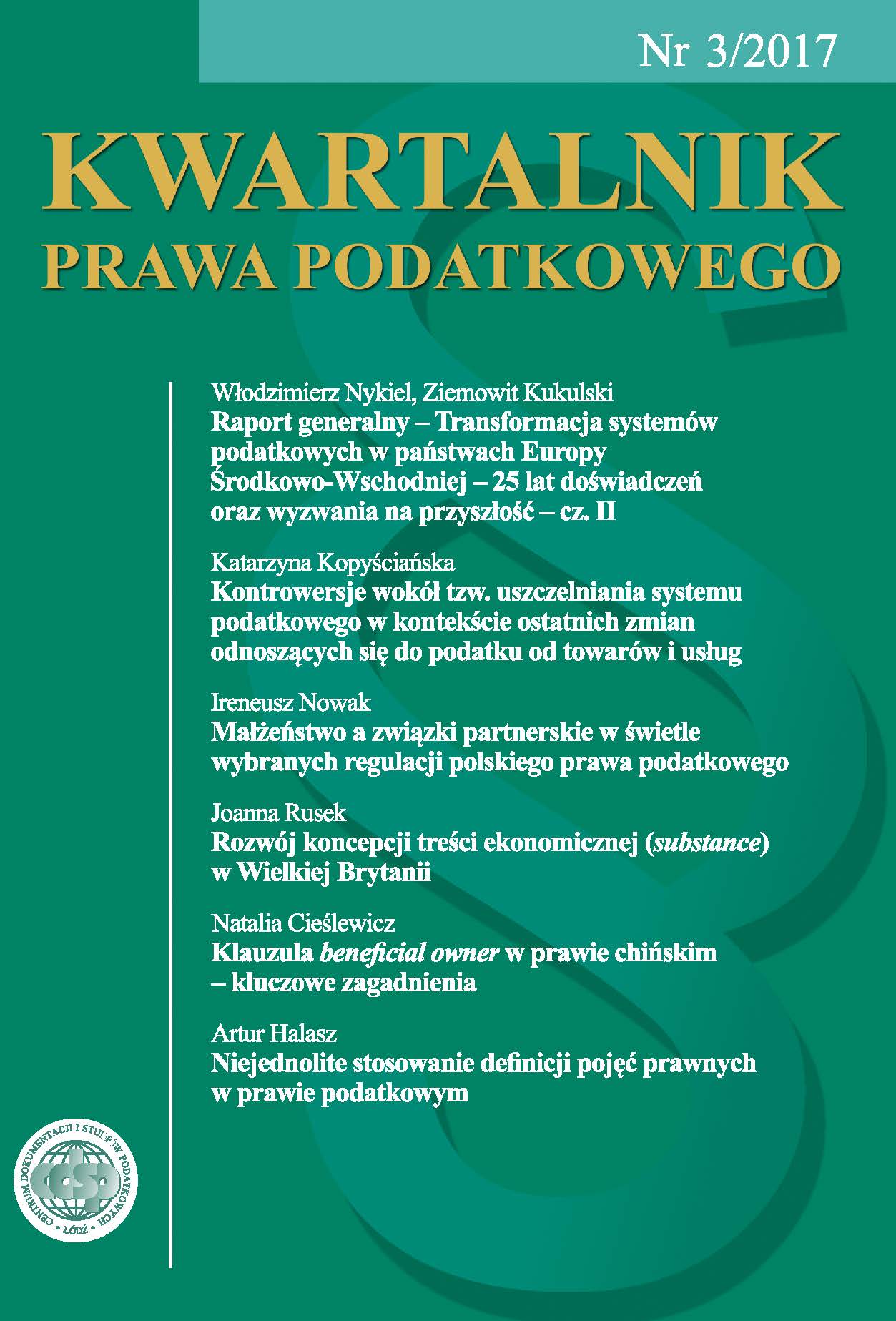Beneficial owner clause in Chinese law – crucial issues
DOI:
https://doi.org/10.18778/1509-877X.03.05Keywords:
beneficial owner, tax law, international law, international treaty, trust law, dividends, interest, royalties, Chinese lawAbstract
The underlying goal of this paper is better understanding of the beneficial ownership concept in Chinese law. This term was introduced for the first time to the OECD Model Convention 1977 with aim to prevent the use of Articles 10–12 by agents who have the claim for income. Recently this term was also introduced to Polish law and therefore it inspired the author to further investigation and analysis of its meaning and practical use. Given the fact that in 2001 China passed its Trust Law Act it becomes even more interesting to see how institutions of trusteeship and beneficial ownership function in this country. In opposition to recent changes in Polish law, China never decided to define beneficial owner, but Chinese tax administration regularly publishes updated guidelines to understanding practical use of beneficial owner clause.
Downloads
References
Bany K., Interpretacja dwustronnych konwencji o unikaniu podwójnego opodatkowania, „Przegląd Podatkowy” 2005.
Google Scholar
Bany K., Międzynarodowe konwencje podatkowe a unikanie opodatkowania, „Przegląd Podatkowy” 2006.
Google Scholar
Ecker E., Ressler G., Article 10: Dividends, [w:] History of Tax Treaties-The Relevance of the OECD Documents for the Interpretation of Tax Treaties, Vienna 2011.
Google Scholar
Eliffe C., Beneficial ownership and Double Tax Agreements, New Zealand Institute of Charted Accountants 2012 Tax Conference, 2012.
Google Scholar
Karwat P., Nadużycie prawa w obszarze prawa podatkowego, [w:] H. Izdebski, A. Stępkowski (red.), Nadużycie prawa. Konferencja Wydziału Prawa i Administracji Uniwersytetu Warszawskiego, Warszawa 2003.
Google Scholar
Litwińczuk H. (red.), Krawat P., Pietrasiewicz W., Tetłak K., Kazanowski A., Prawo podatkowe przedsiębiorców, Warszawa 2013.
Google Scholar
Liu J., Eichelberger J., China Tax Scene, [w:] Intertax, Issue 11.
Google Scholar
PwC China, https://www.pwccn.com/en/services/tax/publications/chinatax-news-feb2018-6.html.
Google Scholar
PwC China, https://www.pwchk.com/en/china-tax-news/2018q1/chinatax-news-feb2018-6.pdf.
Google Scholar
Quing X et al, CSRC Released Further Details on Shanghai-Hong Kong Stock Connect, 2014.
Google Scholar
du Toit C.P., Beneficial Ownership of Royalties in Bilateral Tax Treaties, IBFD, Amsterdam 1999.
Google Scholar
Vann R.J., Beneficial Ownership. What Does History (and maybe policy) Tell Us, Sydney 2012, http://ssrn.com/abstract=2144038 [dostęp: 12.07.2017].
Google Scholar
Vogel K., Double Tax Treaties and Their Interpretation, London 1997.
Google Scholar
Vogel K., Klaus Vogel on Double Taxation Conventions, London 1997.
Google Scholar
Vogel K., Prokisch R., General Report. Interpretation of Double Taxation Conventions, IFA Session, Florence 1993, „Cahiers de Droit Fiscal International”, Vol. LXXVIIIa.
Google Scholar
van Weeghel S., The Improper Use of Tax Treaties: With Particular Reference to the Netherlands and the United States, London 1998.
Google Scholar
Wilk M, Klauzula rzeczywistego beneficjenta (beneficial ownership) w międzynarodowym prawie podatkowym, Warszawa 2015.
Google Scholar
Downloads
Published
How to Cite
Issue
Section
License

This work is licensed under a Creative Commons Attribution-NonCommercial-NoDerivatives 4.0 International License.
PlumX metrics









